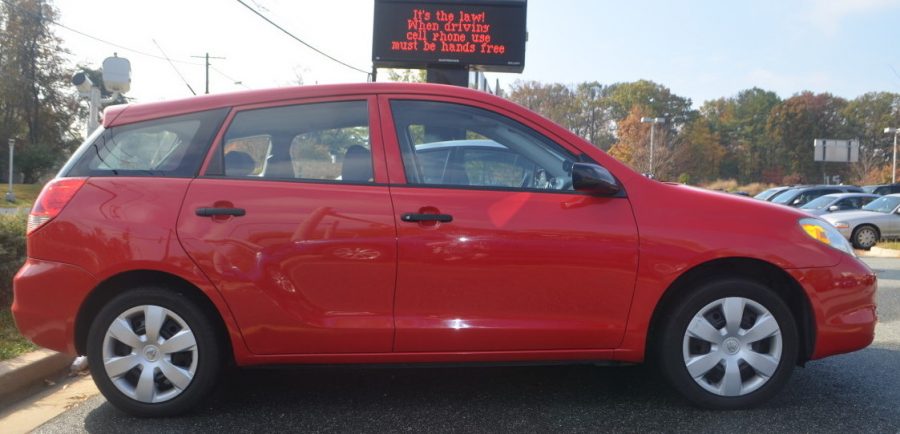Maryland Legislature Passes New Driving Bill Banning Handheld Devices and Requiring Seatbelts
A student’s car is parked in front of the RHS electronic sign that reads a message about the new law requiring cellphones to be hands free in the car. Students will be reminded of the law as they enter and exit the parking lot. –Adam Bensimhon
November 7, 2013

Enforced Oct. 1, new Maryland driving laws ban the use of hand-held cellphones while driving and making it a requirement for all passengers to wear a seatbelt.
If a driver gets caught using a hand-held cellphone, he or she can be fined $75 for a first time offense, excluding hands-free or Bluetooth devices. Before the law update, using a hand-held cellphone was a secondary offense, so drivers could only get a fine for using their phone if they got pulled over for another offense. Now, however, cell phone use is a primary offense.
Another new law in Maryland requires all passengers in the front and back seats of a vehicle to wear seatbelts. Violating this law is a primary offense and has a $50 fine. Drivers can also be fined if there are more passengers in their car than there are seatbelts.
About three years ago, social studies resource teacher Rene Shuler was in an accident due to another driver having his phone in his hand. Shuler suffered permanent damage from the accident. She lost five to 10 percent of the usage in her right arm.
“He wasn’t paying attention a�� he cut right in front of us. My husband swerved to try and miss him and he caught the driver’s door. He caused our full-sized Chevy Silverado to flip four times in the intersection,” Shuler said.
These laws affect many RHS students since a majority of upperclassmen are drivers. Many upperclassmen drive underclassmen to sports practices and over-pack the car.
“I completely agree with the new laws and I feel like they should have been implemented from the start,” junior Gujri Chadha said. “Personally, as a licensed driver I’ve realized how dangerous it is and how important it is that we follow these laws,” Chadha said.
These laws are meant to keep people safe on the roads and help decrease the number of accidents and fatalities due to automobile crashes. Banning cellphones keeps the driver focused on the road, averting distractions that can cause a crash. Requiring all passengers to wear a seatbelt in the vehicle helps keep everyone in the car safe if a crash occurs.
“Maryland did the right thing by adding and enforcing [the cellphone law],” student driver senior Oscar Rivas said. Distracted driving is classified as driving while texting, talking on the phone or even eating while behind the wheel of a vehicle. According to the Centers for Disease Control and Prevention, over 3,000 people were killed in crashes involving a distracted driver in 2011.
“It’s just not worth it. There’s no need to check phones and play with it; it just takes a second. We still cringe when we see a vehicle coming from the side that doesn’t look like they will stop at the intersection,” Shuler said.




